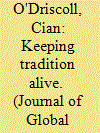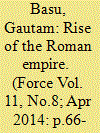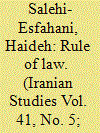|
|
|
Sort Order |
|
|
|
Items / Page
|
|
|
|
|
|
|
| Srl | Item |
| 1 |
ID:
175536


|
|
|
|
|
| Summary/Abstract |
Tragedy is one of the oldest metaphorical lenses of International Relations. The tragic vision of politics, from Thucydides to contemporary realist theorists, lies at the core of classical realism. However, it is striking how rarely the concept of tragedy has been applied to the discourse of humanitarian intervention. This lacuna is a weakness on both the intellectual and political levels, as nowhere are clashes between competing ethical perspectives more glaring. An examination of the concept of tragedy, as conceived from its Greek origins, can illuminate an understanding of the morally contradictory imperatives created by armed intervention. Using the Bosnian War as a case study, Greek classical tragedy provides a framework to grasp the agonising choices and insoluble ethical dilemmas brought about by humanitarian intervention, in contrast to mere narratives of salvation. The argument conveyed in this article seeks to reconcile a tragic vision with the idea of progress and political action. It concludes by suggesting that the fundamental lessons that lie at the heart of tragedy should be associated with another major concept in Greek culture, namely, the Aristotelian idea of phronesis or ‘practical wisdom’.
|
|
|
|
|
|
|
|
|
|
|
|
|
|
|
|
| 2 |
ID:
158996


|
|
|
|
|
| Summary/Abstract |
The just war tradition is one of the key constituencies of international political theory, and its vocabulary plays a prominent role in how political and military leaders frame contemporary conflicts. Yet, it stands in danger of turning in on itself and becoming irrelevant. This article argues that scholars who wish to preserve the vitality of this tradition must think in a more open-textured fashion about its historiography. One way to achieve this is to problematize the boundaries of the tradition. This article pursues this objective by treating one figure that stands in a liminal relation to the just war tradition. Despite having a lot to say about the ethics of war, Xenophon is seldom acknowledged as a bona fide just war thinker. The analysis presented here suggests, however, that his writings have much to tell us, not only about how he and his contemporaries thought about the ethics of war, but about how just war thinking is understood (and delimited) today and how it might be revived as a pluralistic critical enterprise.
|
|
|
|
|
|
|
|
|
|
|
|
|
|
|
|
| 3 |
ID:
137894


|
|
|
|
|
| Summary/Abstract |
Rome’s history spans 2,500 years which saw its transformation from a small village to the centre of a vast empire that witnessed the founding of Catholicism and left an indelible impact on every aspect of civilisation including, of course, military. Just as the influence of Ancient Rome’s culture, architecture, art and language on human history can never be overstated, so also the lasting impact of its episodic wars on the political map of Europe for centuries. Rome maintained the western World’s first professionally trained permanent army of career soldiers who were equipped, paid and even pensioned by the state, a far cry from the farmer-soldiers of Ancient Greece or the part-time citizen-soldiers of Athens. Ancient Rome was one of the largest and grandest military empires ever.
|
|
|
|
|
|
|
|
|
|
|
|
|
|
|
|
| 4 |
ID:
085331


|
|
|
|
|
| Publication |
2008.
|
| Summary/Abstract |
The ancient Persian empires are denoted as despotic, practicing arbitrary rule while Greece, Persia's archrival during the sixth to fourth century BC, exercised rule of law. This paper uses a contract theory framework to analyze some of the geographical and environmental underpinnings of the existence of rule of law in the city-states of ancient Greece and its absence in Persia. I discuss the role of geographical conditions of land (open plains versus mountains), population pressure, proximity to the sea and form of trade (overland versus overseas) as factors conducive to rule of law in the city-states of ancient Greece and to despotism in ancient Persia. Specifically, the role of trade via land in Persia prior to the fifth century BC is compared to the role of sea trade (alongside with piracy) in ancient Greece. I argue that in ancient Persia monarchs could tax or expropriate much of the gains from overland trade, preventing the accumulation of an independent form of wealth by merchants. In Greece, sea trade alongside the practice of piracy led to gains from trade that could not be easily expropriated by the monarchs and acted as a balancing force vis- -vis the power of the monarchs, creating a basis for rule of law in the Greek city-states.
|
|
|
|
|
|
|
|
|
|
|
|
|
|
|
|
|
|
|
|
|